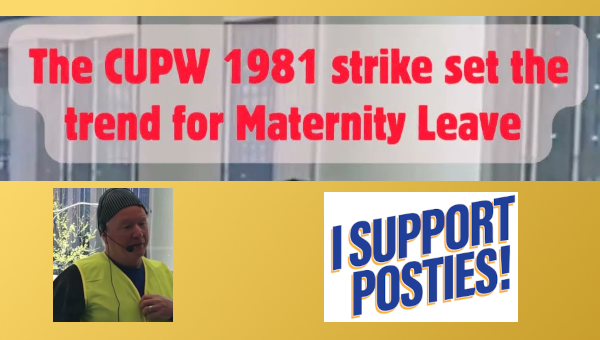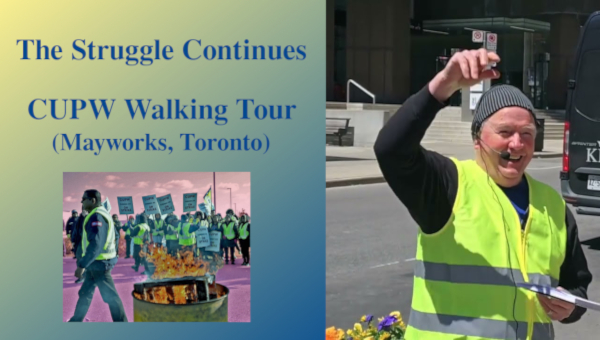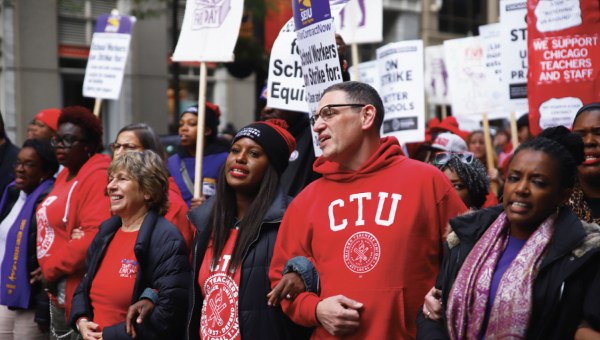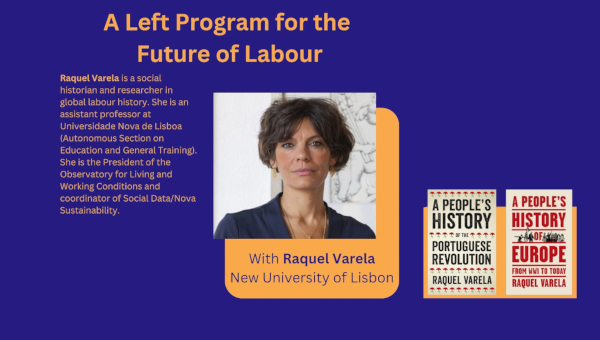Ed Miliband At the Miners’ Gala
A Red Dawn Over Durham?
Although their histories are quite different, the British Labour Party and the U.S. Democrats have one thing in common: both like to avoid too much public cuddling with workers – particularly, any sector of the organized working-class whose militant struggles with management might force them to reveal which side they’re really on.
In America, the Democratic Party’s longstanding treatment of labour as just another ‘special interest’ has set the stage for endless political disappointment. In the U.K., distancing yourself from the traditional culture of unionism is harder, but not impossible for a center-left politician to do, as former Prime Minister Tony Blair demonstrated when he campaigned successfully as the leader of ‘New Labour’ in the mid-1990s (and then proceeded to tarnish that brand as well).

One of the many banners at the 2012 Durham Miners’ Gala.
Three million workers remain formally affiliated with Blair’s Party, via TUC unions, and the word “labour” has not yet been dropped from its name. So here, trade unionists still expect some loyalty from the party that has traditionally spoken for them – whether in government or in opposition when parliament is controlled by the Tories (who rule today in shaky coalition with the Liberal-Democrats).
For much of the 20th century, party leaders paid dutiful homage to Labour’s working-class roots by joining the annual pilgrimage to the Durham Miners’ Gala. Also known as “The Big Meeting,” the Gala has been held for the last 128 years on a grassy racecourse in this beautiful cathedral town on the banks of the wandering River Wear. The event remains the largest single union-sponsored gathering of working-class voters in the U.K. and a very moving celebration of coal mining history, art, culture, and music.
In Durham, the last deep mine closed 19 years ago. So here and elsewhere, the National Union of Mineworkers (NUM), like the United Mine Workers of America (UMWA), is a sad shadow of its former organizational self. Only a few thousand underground miners remain in a handful of surviving pits. But, on July 14th, thousands of NUM retirees and their families, affiliated with the union’s still-functioning lodges, paraded beneath their eighty elaborately illustrated banners, through the narrow streets of Durham. As always, marching tunes were provided by community-based brass bands, fifty of which participated in this year’s procession.
The power of their music was well captured in the 1996 film, Brassed Off, starring Pete Postlethwaite and Ewan McGregor. It deals with the struggle to keep colliery musicians together, after a mine closing in the depressed, black lung-ridden community of “Grimley,” a thinly disguised version of the real-life village of Grimethorpe in South Yorkshire. At the Gala, visiting coalfield bands even play in the city’s magnificent cathedral at a memorial service for the many men killed or injured, since underground mining began. During this unusual, mid-afternoon ceremony, one can listen to the mournful strains of “Gresford,” the miners’ hymn, while the Bishop of Durham blesses any NUM banners brought, for the first time, to The Big Meeting. (This year’s newly consecrated crop included a just-completed panorama by artist Andrew Turner, honoring the work of “Women Against Pit Closures,” the organization of miner’s wives, girlfriends, and daughters founded by Anne Scargill, Betty Cook, and other coalfield feminists.)
Avoiding Photo-Ops With Arthur
Three decades ago – before the coal industry downsizing depicted in Brassed Off the UK employed 170,000 miners in more than 180 collieries. Its solidaristic communities were soon convulsed by the epic strike battle between Conservative Prime Minister Margaret Thatcher and the National Union of Mineworkers (NMU), headed by Arthur Scargill, then husband of Anne. The Iron Lady was bent on taming the NMU and phasing out most domestic coal production if that’s what it took to curb the power of Britain’s most radical union, long allied with Labour.
As Guardian columnist Seumas Milne recounts in The Enemy Within, his definitive study of NUM-busting by the Tories, then-Labour Party leader, Neil Kinnock – a putative foe of Thatcherism – was also discomfited by the blue-collar militancy of the miners. According to Milne, Kinnock “felt impotent and humiliated during the 1984-85 strike.” He viewed Scargill “as a deeply unwelcome presence in the new-model Labour Party he was trying to create” more than a decade before Blair had better luck with the same modernizing project.
The faint-hearted Kinnock made his last appearance at the Miners Gala in 1989 – when a crowd of 50,000 jammed the Old Racecourse. (Some estimates put this year’s total turn-out at twice that number.) After that, he and his successors – John Smith, Tony Blair, and Gordon Brown all avoided Durham like the plague, so they wouldn’t be trapped on the balcony of the County Hotel, reviewing the troops with left-wing union generals like Scargill. Such carefully calculated snubs were, in Milne’s view, designed “to bury the spectre of class politics and trade union militancy which haunted Labour’s effort to construct a post-social democratic electoral machine.”
A Miliband Not Be Confused With Ralph
In 2010, the Party picked Oxford-educated Ed Miliband, a former TV journalist and Labour Party researcher, to replace Gordon Brown as its new leader. But Gala-wise, there was no change of heart last year. Miliband skipped “The Big Meeting” because Bob Crow, of the Rail, Maritime, and Transport workers, was also scheduled to attend. Such close proximity to the colorful and controversial Crow, who proudly proclaims the RMT to be a “socialist union,” was apparently more than Miliband could bear, public relations-wise, so early in his leadership career.
Where Ed grew up, there was less wariness about working-class heroes. His father, Ralph, was a Belgian-born Marxist academic and internationally known figure in the British New Left, who is now buried in Highgate Cemetary not far from Marx himself. Miliband’s mother, Marion Kozak, campaigned for human rights and nuclear disarmament. Drawing further attention to this distinguished family tree, Ed become party leader two years ago by defeating his equally ambitious older brother David, a fellow member of Parliament. (To get a feel, on our side of the Atlantic, for this particular family fissure, imagine the similarly related governors of Texas (George W. Bush) and Florida (Jeb Bush) squaring off against each other in the 2000 Republican primaries.)
Miliband pere’s best known book, Parliamentary Socialism, was a sharp critique of Labour policy and practice, circa 1961. A few years later, the author let his own membership lapse and described PM Harold Wilson’s backing of the Vietnam War as the “most shameful chapter” in Party history. Writing in The Independent, journalist Andy McSmith has noted, accurately, that the elder Miliband’s public life had a “nobility and drama” often missing from the “steady, pragmatic political careers” of his two sons.
Why The Coast Was Clear This Year
Although organizers of the Durham Miners Gala clearly like Bob Crow, they must have been relieved when their RMT comrade decided to stay home this year and sent rank-and-file members, RMT banners, and an exhibition tent instead. This cleared the way for Miliband to be the featured speaker last Saturday afternoon, although the RMT did adorn its booth at the Gala with a huge picture of Scargill, along with a thought-provoking quote from the syndicalist firebrand. His words reminded everyone nearby that “what we need is not marches, demonstrations, rallies…what we need is DIRECT ACTION!”
In the run-up to the Gala, local miners association official Dave Hopper expressed retroactive relief that Blair, unlike Miliband, had never darkened Durham’s door during the Party leadership’s long boycott of the event. “Blair spent his time starting wars and wrecking the health service,” Hopper told the Durham Times earlier this month. “He would have besmirched the platform.”
Hopper praised the current leader’s display of “courage” in coming and promised, as chair of the event, to insure a polite reception. “You can’t stop people who don’t want to listen,” the retired miner noted. “But let’s hear what he has to say.” Hopper predicted that most Gala attendees would be “quite pleased” to have Miliband since “the County Council has been Labour controlled for 93 years, all borough councils have vast Labour majorities, and every constituency regularly elects Labour MPs.” Even in two neighboring counties, “the Tories and the liberals were obliterated,” Hopper boasted. “They represent the interests of big business and capitalism and we want no truck with them!”
A “Friend” Among Comrades
In The Guardian, Lady Warsi, a baroness born in Pakistan and the Tories’ national party co-chair, seemed equally enthused about Miliband’s July 14 travel plans. Calling him “Red Ed,” she hailed the end of “23 years of silence from the Labour leadership at the Gala,” and predicted that his appearance there would “drive the Labour Party away from the centre ground of British politics” (where it’s not clear she resides either). She accused Miliband of “cozy[ing] up to his militant, left-wing union paymasters.”
Seated among the speakers’ at the Gala last Saturday, Miliband was definitely rubbing elbows with top officials of the General, Municipal, and Boilermakers’, the Public and Commercial Services union, and the shrunken NUM, not to mention two Spanish miners who came directly from highway blockades in Asturias and left with 10,000 English pounds to support their pit closure resistance.

Neatly attired in a red tie and dark suit, the slim, dark featured 42-year old Labour leader looked every bit like an up-and-coming young London banker or accountant, who had strayed, by accident, onto a country fairgrounds filled with tens of thousands of white working-class north easterners. Few of the latter were dressed like anyone on the platform, with the exception of the T-shirt wearing Spaniards and 87-year old Tony Benn, the now retired tribune of Labour’s parliamentary left, who kept his rambling wear on, instead of displaying his Sunday best.
On the perimeter of the Old Racecourse, many Gala-goers were enjoying themselves on the ferris wheel and Helter-Skelter ride, at the Fun House and Crazy Circus, and inside an attraction called “Jungle Madness.” But thousands also stood stock still, in front of the speaker’s platform, listening to two-hours worth of verbal barrages against the “Con-Dems” in Westminster. At one point, Dave Hopper, who was chairing the event, seemed to take notice of the different sartorial tastes of those on platform as opposed to the thousands of Labour loyalists standing patiently before them on the grass. “We’re getting surrounded by lawyers and barristers up here,” he joked.
Restoring The Right To Strike?
Fortunately, one member of the bar, who spoke before Miliband, did what no union official on the platform dared: he directly challenged the new Party leader to strengthen national labour law when and if Labour defeats the Tories. Longtime NUM solicitor John Hendy, QC, displayed a sharp wit, in his open-air tutorial on the current state of collective bargaining in Britain. First he turned to Miliband and cheekily told him to get his pencil out so he could “take a note” on what was being said. Then he informed the appreciative crowd: “I want to talk about trade union rights, and I will be short because we don’t have any.”
The tall, white-haired Hendy quickly chronicled the disastrous decline in collective bargaining coverage, from 80 per cent of the workforce in 1979 to 30 per cent today. He blamed not just Thatcher, but Blair for “British laws on trade unions that are now the most restrictive in the western world.” He effectively linked declining union density to the UK’s increase in poverty, income inequality, and various social ills. He pointed out that workers’ rights “are human rights guaranteed in international treaties, and binding on this country.”
“What we need,” Hendy concluded, “are trade union rights, like the right to strike, the power to take industrial action.” And, then turning to Miliband again, he said: “Ed, you now have a respectable, unimpeachable, legal argument for reinstating these rights.”
New Battle of Britain?
Miliband’s own Obama-esque oration was a mere 11-minutes long. His prepared text contained no mention of collective bargaining and he never deviated from it, in response to Hendy. His carefully scripted cadences elicited only a few scattered catcalls from within the vast crowd, which he addressed as “friends,” not “comrades,” the old school salutation favored by other speakers. As Miliband summed up Labour’s destiny last Saturday, it is “to rebuild our country…on the values of the people of Britain: responsibility, community, fairness, equality, and justice. That’s our mission, that’s our task, that’s the battle we can win together.”
His (only slightly less vague) agenda for “day one” of a future Miliband government included breaking up the banks and/or taxing bankers’ bonuses, ending “energy rip-offs,” and curbing the power of press moguls like Rupert Murdoch. To whet the appetite of those present, he invoked the memory of past Labour PM’s like Atlee and Wilson (wisely leaving Blair off his list).
As local party officials and visiting union dignitaries filed off the stage, an impressive throng of spectators surrounded Miliband, shaking his hand, patting him on the back, and thrusting program books his way to be autographed. While “Red Ed” made his way slowly to the Labour tent, I shook hands with Tony Benn instead. The aging lion of the British left had just spent his 51st “Big Meeting” hunched over in a folding chair near the edge of the platform, smoking his pipe, and seemingly lost in thought. A former cabinet member and MP for five decades, Benn was introduced to the crowd only in passing. As he walked away unsteadily afterwards, aided by a young assistant, a few other longtime fans greeted him reverently.
As Solicitor Hendy departed the stage, I asked him what Miliband’s non-response portended for labour law reform in the U.K. “His pencil must have been blunt,” he said with a smile, adding that “we’re still working on it and we’ll get there in the end.” At a post-Gala screening of a documentary called “Will and Testament,” which chronicles Benn’s career, the old socialist was similarly upbeat, but more protective of the new boy who had failed to pick up the gauntlet thrown his way.
In a Q&A session after the film, I queried Benn about Miliband’s performance. He agreed that “the rights of trade unionists need to be restored” and that Hendy’s points were “powerfully made.” But, in his view, Miliband had shown adequate union sympathy at the Gala. According to Benn, if the Party leader addresses workers rights in the future, he will “be taking on some formidable opponents and he knows it.”
But overcoming such foes won’t be possible without mobilizing Labour’s traditional base, plus many new recruits to the party. If Miliband isn’t even willing to pander, Obama-style, to a pro-union crowd – by applauding collective bargaining he’s certainly not going to defend the practice before a national audience or make strengthening unions a post-election priority. And the result of that political positioning could be exactly what workers have gotten, in the U.S., from their own ‘friend of labour,’ since he entered the White House four years ago. •





